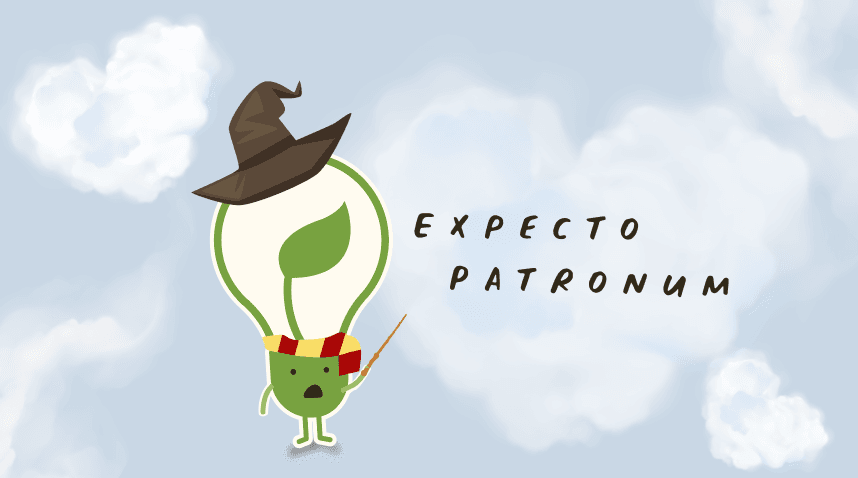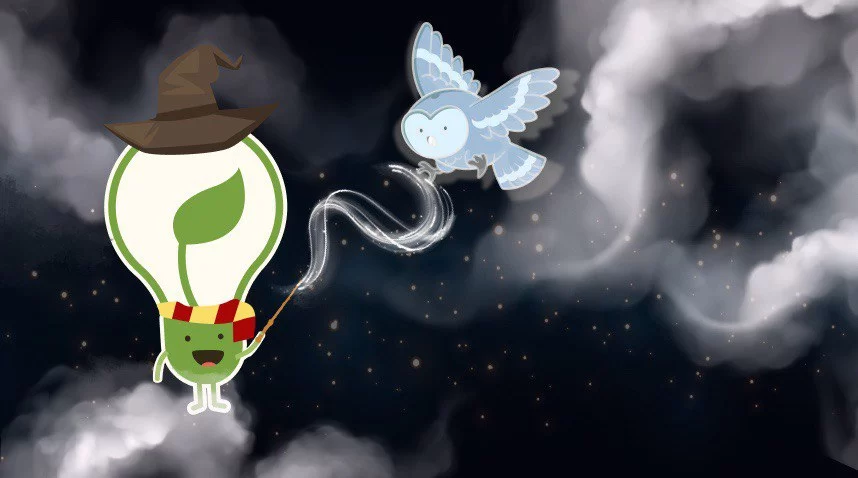TLDR: The Harry Potter series has demonstrated many different ways for us to cultivate immeasurable love to ourselves and other beings. Apart from learning different spells in Hogwarts, we can also apply our magical abilities to further strengthen our loving-kindness and extend the benefits of metta to the muggles and beyond!
“Expecto patronum!” I exclaimed as I garnered all the thoughts of loving-kindness (metta in Pāli) within me to cast my Great Grey owl patronus, wishing all sentient beings around and beyond me well and happy. As I get up from my seat cushion, I visualise my energy and joy restored – just as how the dementors are scattered to the four winds by my patronus charm, bringing back happy thoughts.The joy of peace hugs me.
Dementors are a type of soul-less evil creature and thought to be the foulest beings on Harry Potter’s planet Earth. They have the power to consume the happiness out of you, creating feelings of dejection and despair.
A dementor’s kiss, the kiss of death.
Some of us may forget what our first kiss was like. You’ll never forget being kissed by a dementor, however, in fact you’ll forget everything – instead of your saliva, the kiss sucks your soul, trapping its lovers forever, so deadly that it leaves its victim lifeless in a permanent vegetative state – a punishment worse than death.
A patronus charm is one of the most powerful protective spells and it’s also the main spell used to protect against dementors. The charm takes the form of an animal in which the caster shares a great affinity with.
It is an exceptionally complicated and difficult spell to produce, as it channels the caster’s happy emotions into a spirit guardian. A patronus drives away dementors due to its counterforce of immense positive energy.
Patronus equals Metta?
A patronus spell is the only way to protect us against a dementor. Initiating as a pure concentration of happiness, it conjures a spirit guardian that drives away dark creatures.
Likewise, metta is the direct remedy the Buddha recommends to counteract ill will. Metta bhavana, or loving-kindness cultivation, allows us to develop friendliness and spontaneous feelings of positivity, which is extended universally to all beings without discrimination or reservations.
This is one of many examples of how we can find similarities of Buddhist values in the stories of Harry Potter and his friends.
The Harry Potter series of books is one of the most widely read young adult fantasy series in the world; I’m sure that most of us have come across the story in one way or another. What can we learn and apply from Harry Potter? Quite a lot! The idea of loving-kindness features strongly in Harry Potter. Here’re some scenes you might have missed!
The magic of Metta

As mentioned at the beginning, the patronus spell is basically a form of loving-kindness meditation. So now the question is, how do you practise loving-kindness meditation? Just like how a great witch (me, haha) would cast her patronus, one must first muster happy sensations!
We first begin with the development of loving-kindness (metta) towards ourselves, wishing ourselves to be well and happy, to be free from physical and mental suffering.
I propose to take oneself as the first object of metta as true loving-kindness for others is only practicable when we are able to feel genuine loving-kindness for ourselves. How do we love others when we cannot even love ourselves, right? We can’t possibly pour from an empty cup! A lot of our anger and aversion directed towards others spring from the negativity we grasp on ourselves.
Hence, to grant access to the flow of friendliness and kindness outwards, we need to melt down the hardened scab embodied by negative attitudes. Once the feeling of metta kindles and fills us up, we can stretch it to others: shifting from our loved ones, to furry animals, and to acquaintances. We wish them to be well, healthy and happy.
As our patronus gradually takes its form and shape, we are ready to broaden it to people whom we are not agreeable with. Bit by bit, aversion and ill will, like dementors, won’t have room and will soon diminish in Azkaban, the detention facility for convicted criminals in the magical world .
The idea behind dementors
Interestingly, J. K. Rowling, Author of the Potterverse, mentioned that she used depression and self-hatred as a source material for dementors. Dementors are the very personification of our inner demons.
Self-hatred often comes with a heavy price tag.
It makes us perturbed, dissatisfied with life, or even depressed. Just like the dementors, self-hatred sucks the happiness out of us, leaving us feeling nothing but a sense of lack within.
What can we do at times like this? We can confront our self-loathing thoughts in a non-judgemental way by sending metta to ourselves. Metta involves being friendly and benevolent as opposed to being harsh and judgy. Ironically, many of us make incredibly harsh, cruel self-criticism that we would never have uttered to a total stranger, let alone someone we care about.
An opportunity to spend time with ourselves

Metta meditation gives us the opportunity to spend some time with ourselves. As we pay close attention and awareness to each moment, we can open our hearts to genuinely loving ourselves for who we are. We accept our foibles and imperfections.
By developing a calm and open state of mind, we can see ourselves and others more clearly and lovingly. We understand that other sentient beings are not much different from ourselves, each in search of happiness and steers clear of suffering.
We may, perhaps, be more inclined to find the courage to let go of the hurtful past.
Loving ourselves is the gateway to loving others.
Another component unravelled in the Potterverse is mindfulness. Just as Harry taught Dumbleldore’s Army how to fight off bad guys in Harry Potter and the Order of the Phoenix where the kids had to fend for themselves against Voldermort’s death squad, your patronus can only protect you for as long as you stay focused.
When we aren’t mindfully aware of the suffering we are facing, we can’t give ourselves compassion. We are just repressing the pain or ignoring it, or being involved in the maze of problem solving..
We have to pause for a moment, admit and accept the torment. And we acknowledge that in this moment, we need metta for ourselves. We can’t be kind to ourselves if we refuse to face the distress.
By being mindful, we recognise that we are suffering. Being kind to ourselves in that suffering helps to reduce anxiety and related depression too.
What about the death eaters in our lives? What can we do?
Apart from identifying that cruelty to ourselves stands from distress and suffering from within, we may also discover that many people, whom we deemed as “profoundly wicked” or whose mission in life seem out to make us uneasy, are also in pain inside.
The all-time great wizard Albus Dumbledore saw through Voldemort past his icy snake-like skin and understood that Voldemort is in fact lonely and very much dissatisfied with his life. Dumbledore managed to grow his compassion in sight of such an “evil person”.
He nudged Harry, “do not pity the dead, Harry. Pity the living, and, above all, those who live without love.”
Dumbledore strongly believes it is more tragic to be alive and loveless than dead. Apart from pity, we could also turn this compassion into empathy: Voldemort was conditioned into the way he was.
Voldemort was, after all, conceived without love, his father abandoned his mother and him. Both his parents were unhappy and he spent most of his childhood in an orphanage as a loner. Even for someone as powerful and monstrous as he is, we could see that Voldemort was suffering.
In Potterverse, we notice that there are far more creatures other than humans that have magical ability. Likewise, in the muggle world, metta radiates beyond the human realm.
In the Harry Potter prequel, Fantastic Beasts, we saw how Newt Scamander, a magizoologist known for his passion for magical creatures and beasts, was delightfully fascinated by all creatures, even those that seem hideous to the normal eye, stretching as far as to describing them as fantastic. Newt feels extremely connected to all sorts of creatures and always defends them.
Leta Lestrange, one of the closest friends of Newt since their Hogwarts days, affirmed this by saying Newt has never met a monster that he couldn’t love.
We can learn to have a heart just like Newt Scamander in Fantastic Beasts, big enough to room any living creatures, no matter what it is. But how?
Metta sutta and Harry Potter
Metta is non-discriminatory, its benefits far exceeds the human realm. The Buddha taught us to be kind to all sentient beings, “whether they are weak or strong, omitting none, the great or the mighty, medium, short or small, the seen and the unseen, those living near and far away, those born and to be born.”
The Buddha was a strong proponent of non-discrimination, so shall our practice on metta be thus. Regardless of race, language, religion, gender, sexuality, etc, all beings deserve to be happy, to be free from suffering and to receive metta from us.
The Buddha has used many similes in his teachings to let us better understand and visualise his point. Buddha has shown us how a love similar to that of a mother’s love could be used to cultivate unbounded love for all sentient beings.
A mother’s love has been greatly emphasised in the Harry Potter series where Lily Potter literally embodied herself by using her own body as a shield to block off Voldermort’s Avada Kedavra death curse to protect her child, her only child.
As Dumbledore has repeated time and again, love is one of the most powerful forms of magic. This magic of love is also the main reason why Harry Potter is untouchable by the Dark Lord till the age of 17.
It is also through love, that Snape, a loyal death eater (did I also mention that it was him who was the spy responsible for informing the Dark Lord the prophecy foretelling Voldermort’s downfall and lead to the eventual death of Lily Potter whom he tried so hard to protect?!?!), betrayed the dark side and joined the path of righteousness.
The power of Metta

Learning from Voldermort’s defeat, we shall not look down on the power of metta. The Buddha reminded his disciples to not underestimate metta using the stars and moon’s radiance as an analogy:
Just as the radiance of stars do not match up to sixteenth part of the moon’s radiance, no one worldly merit is worth a sixteenth part of a mind released by loving-kindness. A mind that radiates loving-kindness and full of love glows and dazzles, shining brighter than a diamond.
There are a lot of takeaways from our daily mundane life regarding metta that we can reflect on. Even if religion is not involved, cultivating metta does no harm but let us be kinder and make the environment we live in a more bearable place.
May we continue to practice kind speech and actions to avoid hurting others and ourselves, cultivate right thoughts. With the right means, may we have compassion for ourselves and to those around us.
May we have the right effort and energy to walk the path of peace and pave the way for a happier, harmonious and suffering-free world filled with metta.
May we be a great wizard with a powerful patronus. And may we be well and happy. Because at the end of the day, “Yer a wizard Buddha, Harry!”
Try a short 10 mins guided meditation today!
Wise steps:
- Cultivate metta to counteract any ill will or anger we have for someone or something.
- We need to love ourselves first as a key to love others.
- All beings strive to maximise happiness and avoid suffering. Metta is non-discriminatory and radiates beyond the human realm.


